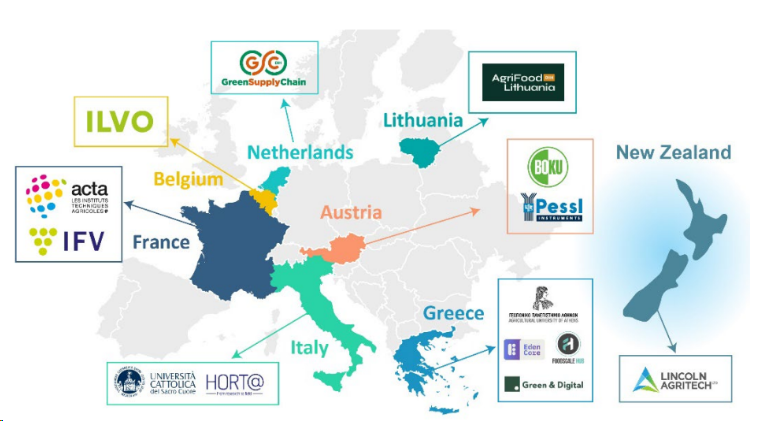We are excited to announce a new project!
Taking plant health to the next level with the STELLA project
Weiz (Austria), 5th January 2024 – Pessl Instruments, the global manufacturer and leading provider of advanced agricultural technology solutions under the METOS® brand, announces a new project – STELLA.
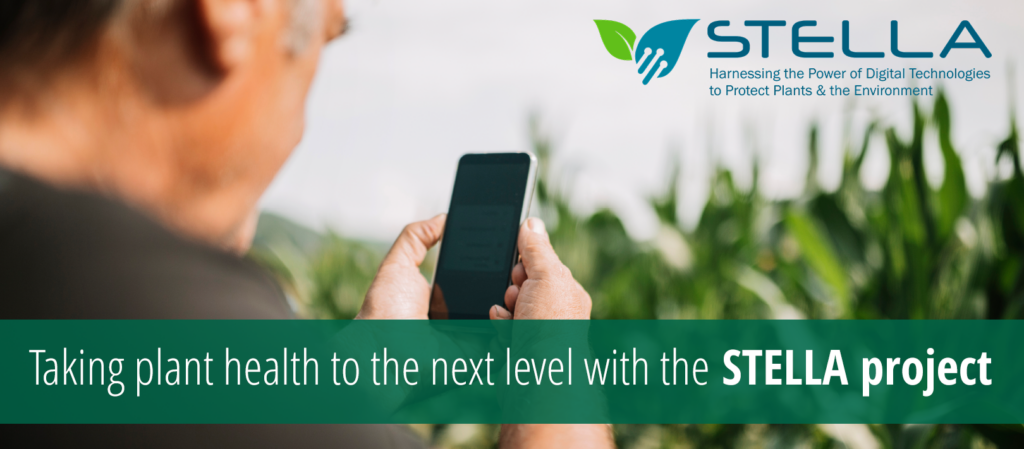
Description and Mission
Plant diseases and invasive insects have staggering global economic costs, reaching $220 billion and $70 billion annually, causing a significant 40% loss in global crop production, and impacting 35 million hectares of forest. Recognized as major contributors to irreversible crop damage, quarantine and regulated non-quarantine pests (RNQPs) lead to substantial economic losses. The challenges posed by climate change, globalization, population growth, and intensified international trade further threaten ecosystems and biodiversity by reshaping the distribution of plant pests. Despite the imperative to minimize RNQP outbreaks and prevent the introduction of quarantine pests, the absence of monitoring and surveillance systems hampers the study of these pests. Additionally, it impedes the collection of data for Artificial Intelligence algorithms.
The STELLA project positions itself to advance the current state-of-the-art in plant health early detection, territory surveillance, and phytosanitary measures, specifically focusing on RNQPs and quarantine diseases and pests.
By leveraging cutting-edge digital technologies in agriculture across Europe and New Zealand, STELLA aims to develop a robust and accurate monitoring system, the STELLA Pest Surveillance System (PSS), supporting early detection, territory surveillance, and phytosanitary measures. This system, accessible via the STELLA PSS Platform, consists of three subsystems: early warning, pest detection, and pest response. These subsystems incorporate the latest developments in Artificial Intelligence, Spectral Imaging, Modelling, IoT, Data, Smart traps, and hardware to create accurate and robust solutions. The STELLA PSS is shown below in Figure 1.
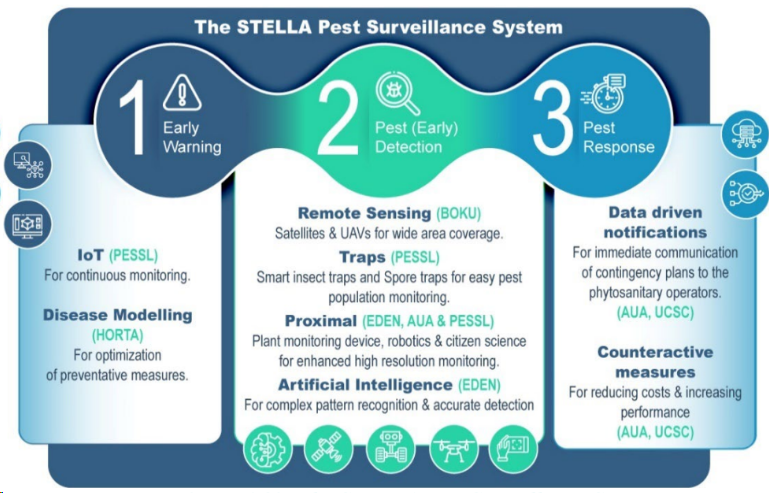
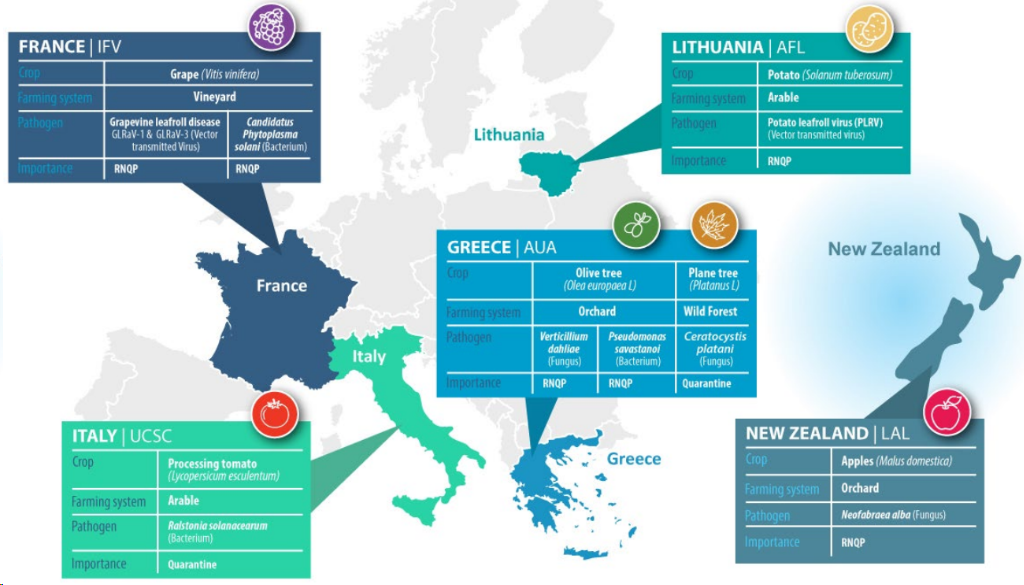
Stakeholder engagement is emphasized through citizen science, and capacity-building activities equip stakeholders with the necessary skills to use the STELLA PSS and implement environmentally friendly crop protection alternatives.
STELLA aims to establish links and synergies with innovative farmer cooperatives, CAP networks, organizations, citizen groups, and other projects to enhance relations and knowledge exchange.
The ultimate goal is to develop policy recommendations that promote the widespread implementation and sustained use of digital technologies in plant health policies, enabling the adoption of project innovations and facilitating the transition to more digitized agriculture.
This approach ensures that plant diseases and pests pose fewer threats and are treated through data-driven strategies, contributing to a sustainable and resilient agricultural industry in the EU.
The STELLA concept is summarized in Figure 3.
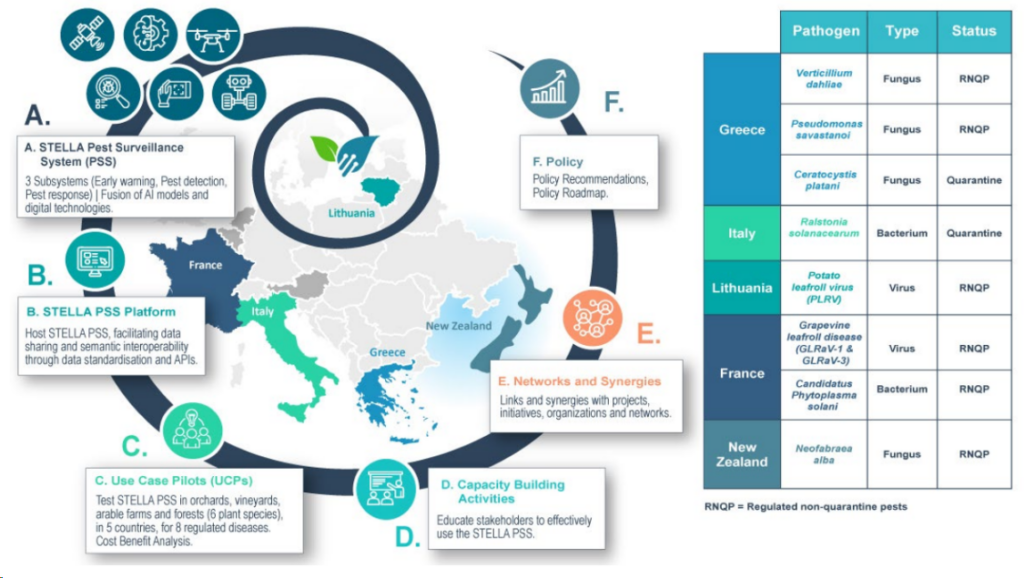
Our Role in the Project
Pessl Instruments’s primary roles involve mobile application development for crowdsourcing and co-developing IoT protocols for standardized data collection by ensuring diverse and accurate data sources for pest and disease monitoring.
1. Developing and Providing a Mobile Application:
- Pessl Instruments leads Task 2.4 (Crowdsourcing), focusing on the development and modification of the smartphone application for crowdsourcing data collection.
- The app facilitates data collection from UCP fields and global fields, recognizing selected pests and utilizing GPS capabilities for spatial distribution understanding.
- Compatible with iOS and Android devices, the app will enable stakeholders to capture and upload images of healthy and damaged plants to the STELLA platform for further processing.
- Pessl Instruments is responsible for app monitoring, updates, and implementation of crowdsourcing protocols.
2. Utilizing IoT Devices for Data Collection:
- Pessl Instruments contributes to Task 2.1 (Data Collection Protocols) by co-developing three IoT protocols for field-level data acquisition using various sensors. These IoT protocols ensure standardized and efficient data collection, adjusted for geographical variability and crop type.
- Pessl Instruments will develop and provide the project with novel smart insect traps to detect and monitor the insect vectors of the examined crop diseases. These traps will use different attractants (sound, color, pheromone), based on the different insects-vectors’ specificities, to achieve maximum trapping efficiency.
- In addition, Pessl Instruments will provide spore traps to monitor airborne fungal spores concentration to identify the onset of the fungal diseases and to monitor their progression over time. Spore traps will be analyzed using analytical molecular methods (PCR, ELISA) to determine the type and concentration of fungus.
- Finally, gathering, extracting, and pre-processing all the IoT and trap (insect and spore) data collected is part of the responsibilities of Pessl Instruments. Both traps (insects and spores) will help the development of accurate crop pest models from task T2.3.
- The collected data feeds into the STELLA database (task T2.5 and WP3) for further use in modeling and analysis.
Partners
- PESSL Instruments GmbH
- GEOPONIKO PANEPISTIMION ATHINON (AUA)
- UNIVERSITA CATTOLICA DEL SACRO CUORE (UCSC)
- EIGEN VERMOGEN VAN HET INSTITUUT VOOR LANDBOUW- EN VISSERIJONDERZOEK (EV ILVO)
- UNIVERSITAET FUER BODENKULTUR WIEN (BOKU)
- GREEN & DIGITAL IDIOTIKI KEFALAIOUCHIKI ETAIREIA (GREEN & DIGITAL)
- FOODSCALE HUB GREECE ASSOCIATION FOR ENTREPREUNERSHIP AND INNOVATION ASTIKI MI KERDOSKOPIKI ETAIREIA (FSH)
- ACTA ASSOCIATION DE COORDINATION TECHNIQUE AGRICOLE – LES INSTITUTS TECHNIQUES AGRICOLES (ACTA)
- HORTA SRL (HORTA SRL)
- GREEN SUPPLY CHAIN DIGITAL INNOVATION HUB ASTIKI MI KERDOSKOPIKI ETAIREIA (GSC)
- AgriFood Lithuania DIH (AFL)
- EDENCORE TECHNOLOGIES IKE (EDENCORE)
- INSTITUT FRANCAIS DE LA VIGNE ET DU VIN (IFV)
- LINCOLN AGRITECH LIMITED (LincolnAgritech)
